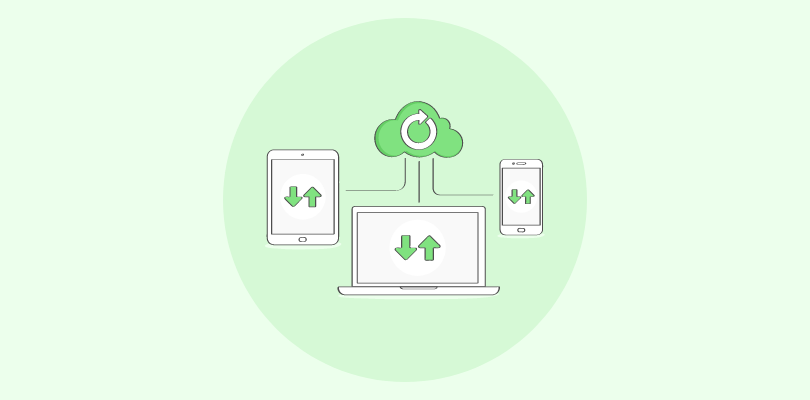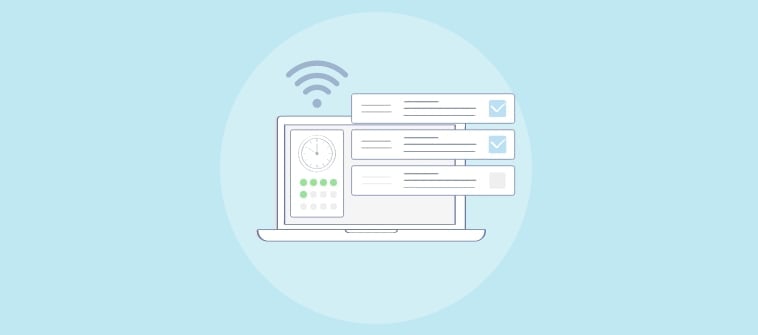Picture walking into a classroom buzzing with a different kind of energy – where every student is not just learning but also actively understanding and shaping their educational journey. This is the power of student self-assessment.
Beyond mere academic evaluations, self-assessments are a transformative tool. They foster self-awareness, goal-setting, and critical thinking, driving students toward personal growth and empowerment.
In this guide, we explore the diverse benefits and types of self-assessments. We’ll also learn how to create one of the most powerful types of assessment – online quizzes.
Let’s dive in and unlock the potential of self-assessments to revolutionize the classroom experience.
Benefits of Self-Assessment
Here are some of the major benefits of self-assessments for students.
| Self-awareness | Self-assessment helps students to gain a deeper understanding of their strengths, weaknesses, and areas of improvement. They become more aware of their abilities and areas where they need to put in more effort. |
| Goal setting | By evaluating their own progress, students can set realistic goals and work towards achieving them. Self-assessment allows them to identify areas where they need to improve and set specific targets to enhance their learning outcomes. |
| Motivation | Self-assessment encourages students to take ownership of their learning and become more motivated to perform better. They feel a sense of accomplishment when they see their progress, which positively impacts their motivation and engagement with the learning process. |
| Critical thinking | Through self-assessment, students develop critical thinking skills by analyzing and reflecting on their own work. They learn to evaluate the quality of their arguments, identify logical fallacies, and understand different perspectives. Self-assessment fosters a habit of critical thinking that goes beyond academic assignments and prepares them for real-world situations where critical analysis is required. |
| Learning from failures | Self-assessment allows students to identify their mistakes, learn from them, and avoid making the same errors in the future. It helps them develop resilience and a growth mindset, understanding that failures and setbacks are opportunities for learning and improvement. |
| Independence | By assessing their own progress, students become more independent learners. They learn to monitor and evaluate their own learning journey, identifying areas where they need support or additional resources. Self-assessment encourages them to take initiative and seek learning opportunities beyond the classroom. |
| Effective decision-making | Self-assessments enable students to make informed decisions about their learning. By reflecting on their strengths, weaknesses, and preferences, they can actively choose study strategies, learning resources, and educational pathways that work best for them. This empowers them to control their learning and make decisions aligned with their goals. |
| Self-reflection | Students can reflect on their growth, identify areas of improvement, and develop strategies to enhance their learning experience. Regular self-reflection helps them understand their learning process, their preferred learning styles, and the most effective ways to retain and apply knowledge. It encourages continuous improvement and self-directed learning. |
| Increased self-confidence | Regular self-assessment boosts students’ self-confidence as they see their progress over time and recognize their achievements. By acknowledging their strengths and growth areas, they develop a positive self-image and belief in their ability to succeed. This confidence extends beyond academic performance and positively impacts their overall personal and professional development. |
| Accountability | Self-assessment instills a sense of responsibility and accountability in students as they take ownership of their own learning outcomes. It encourages them to actively engage in learning, meet deadlines, and complete tasks to the best of their abilities. Students become aware that their efforts and actions directly impact their academic success and personal growth. |
Types of Self-Assessments for Students
Online Quizzes
Online quizzes and practice tests serve as a valuable tool for self-assessment. These interactive assessments allow individuals to evaluate their knowledge and skills on various subjects or topics. They cover various subjects, including math, science, language, social sciences, professional development, and hobbies.
Whether for educational purposes or personal growth, these quizzes offer a convenient and effective means of self-evaluation in just a few clicks.To generate online quizzes for student self-evaluation, you can use an online tool like ProProfs Quiz Maker, which has an AI quiz maker to generate quizzes on any topic in just a few seconds.
To generate online quizzes for student self-evaluation, you can use an online tool like ProProfs Quiz Maker, which has an AI quiz tool to generate quizzes on any topic in just a few seconds.
Rubrics & Checklists
Using rubrics and checklists, students can assess their work against predetermined criteria. They evaluate their performance, identify areas for improvement, and set specific targets to enhance their learning outcomes. This self-assessment method promotes critical thinking and self-directed learning.
Peer Assessment
Peer assessment involves students evaluating their classmates’ work. By participating in peer assessment activities, students gain a broader perspective on their own progress and learn from their peers’ strengths and weaknesses. This method of assessment encourages self-reflection and promotes collaboration and constructive feedback.
Self-Assessment Questionnaires
Students can complete self-assessment questionnaires that aim to measure their own skills, attitudes, and learning preferences. These questionnaires help students understand their strengths, weaknesses, and areas for improvement. Students can make informed decisions about their learning strategies by analyzing the results.
Learning Logs
Learning logs allow students to track their learning progress over time. They record their accomplishments, challenges, and reflections on their learning experiences. This self-assessment method encourages students to take responsibility for their learning, identify growth areas, and develop strategies to overcome obstacles.
Portfolios
Students can compile portfolios that showcase their best work throughout the academic year. Portfolios allow students to self-assess their performance, reflect on their growth, and set goals for improvement. This method encourages students to take pride in their achievements and engage in metacognitive thinking.
Self-Reflection Activities
Various self-reflection activities, such as writing prompts, guided questions, or video diaries, can help students reflect on their learning experiences. These activities prompt students to identify their strengths, weaknesses, challenges, and strategies that have been effective in their learning process. Self-reflection activities foster metacognitive skills and promote self-awareness.
Teachers can also incorporate video response questions into self-reflection activities, allowing students to articulate their thoughts and feelings visually and verbally, further enhancing their introspection and self-expression skills.
Goal-Setting Worksheets
Goal-setting worksheets help students set specific, measurable, achievable, relevant, and time-bound (SMART) goals. By assessing their current abilities and considering their desired outcomes, students can develop a clear plan and take action towards their goals. This can help to promote motivation, focus, and self-discipline.
Learning Inventories
Learning inventories assist students in evaluating their preferred learning styles, study habits, and strategies. By understanding their learning preferences, students can optimize their study routines, engage in activities that suit them best, and make the most of their learning experiences. This method enhances self-awareness and promotes effective learning.
Learning Reflection Conferences
Learning reflection conferences involve students having one-on-one discussions with their teachers to discuss their progress, challenges, and future growth. These conferences provide an opportunity for students to reflect on their learning journey, seek feedback, and align their goals with their teachers’ guidance. It encourages students to take an active role in their education and strengthens their relationship with their teacher.
How to Create an Online Quiz for Student Self-Assessment
Here are three different ways in which you can create an online quiz for self-assessment for students using ProProfs Quiz Maker. Let’s start with the easiest one.
Creating a Self-Assessment With ProProfs AI
Step 1: Go to the quiz dashboard and click ‘Create a Quiz.’
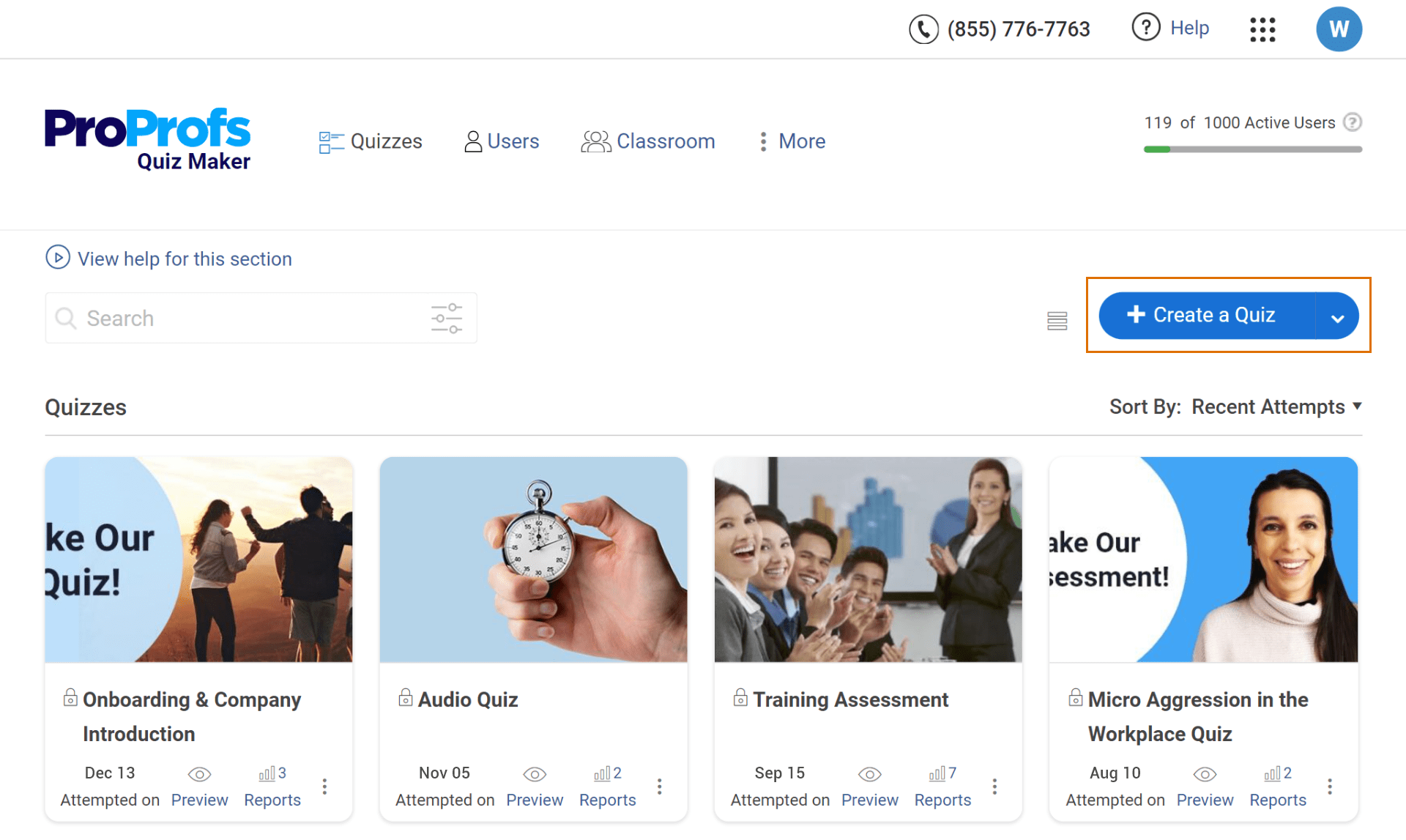
Step 2: Go to “Create with ProProfs AI” to use the AI quiz generator. You can create a quiz from a doc, PPT, video or a simple prompt.
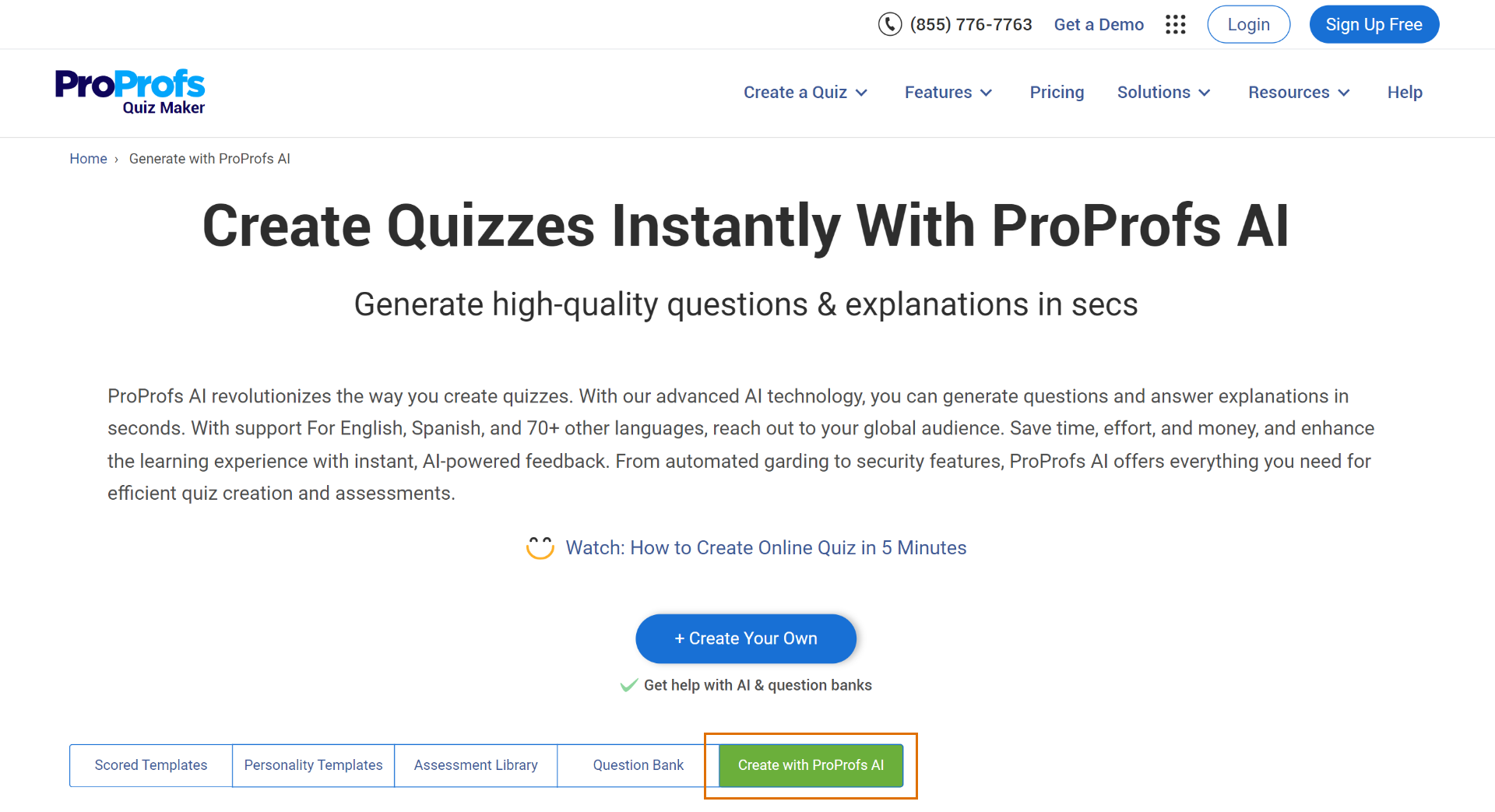
Step 3: Provide the topic of your quiz and some additional information about it.
Next, select the question format, the number of questions, the difficulty level, and whether you want explanations for the answers.
Step 4: Click “Generate Questions” to generate the self-assessment.
Step 5: Choose the questions you want to include in your quiz and click the “Add to Quiz” button.
Then, you can either click the “Add more questions” button to generate more questions or the “Go to Quiz” button.
Step 6: Click “Edit Cover” to add a title, description, and cover image for your quiz.
You can also add images, videos, or audio clips to your quiz to make it more engaging or visually appealing.
You can also manually add some questions or import from a question bank of over a million ready-to-use questions.
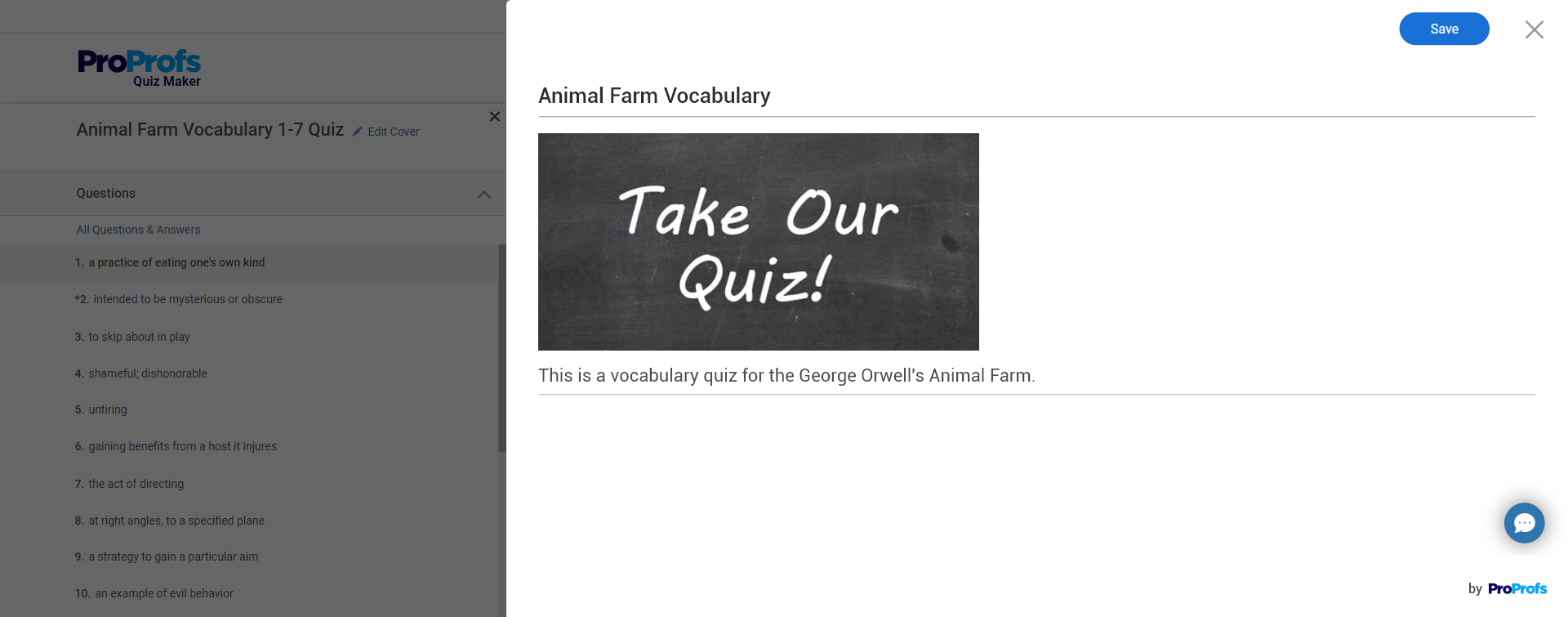
Step 7: Set up a scoring system so that learners can get instant, automated results when they take your self-assessment.
Watch: How to Automate Quiz Scoring & Grading
You can create a customized grading system tailored to your needs by employing flexible scoring options, such as partial grading, custom grading, negative marketing, and bonus points. You can also configure anti-cheating settings, such as shuffling, question pooling, tab-switching prevention, etc.
Read More: How to Create a Quiz Using AI
Creating a Self-Assessment Quiz Using Templates
Step 1: Go to the quiz dashboard and click ‘Create a Quiz.’
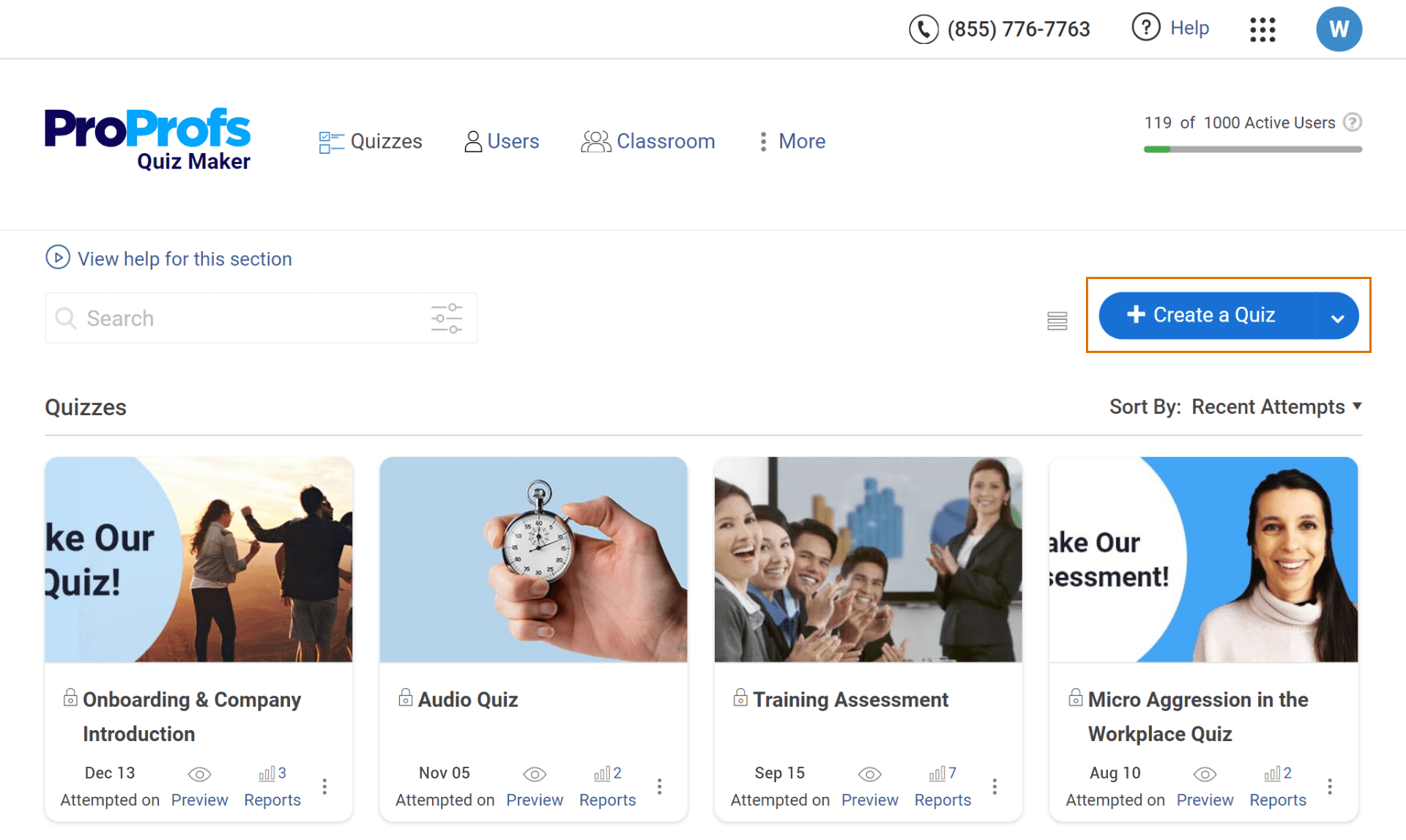
Step 2: You’ll be directed to the templates page, where you can choose between ‘scored templates,’ ‘personality templates,’ and ‘ready-to-use quizzes.’
Step 3: Select the desired template type and click “Use this Template”. Enter your name and proceed. This will redirect you to the page where you can make the desired settings in the quiz.
Post this, you can make the necessary settings in your quizzes.
And you’re done! Isn’t that quick and easy?
To learn more about creating self-assessment quizzes using templates, watch the video below:
Watch: How to Create a Quiz Using Question Bank & Templates
FREE. All Features. FOREVER!
Try our Forever FREE account with all premium features!
Creating an Online Assessment Quiz from Scratch
If you prefer to create an assessment quiz from scratch, follow these steps:
Step 1: On your dashboard, click “Create a Quiz.”
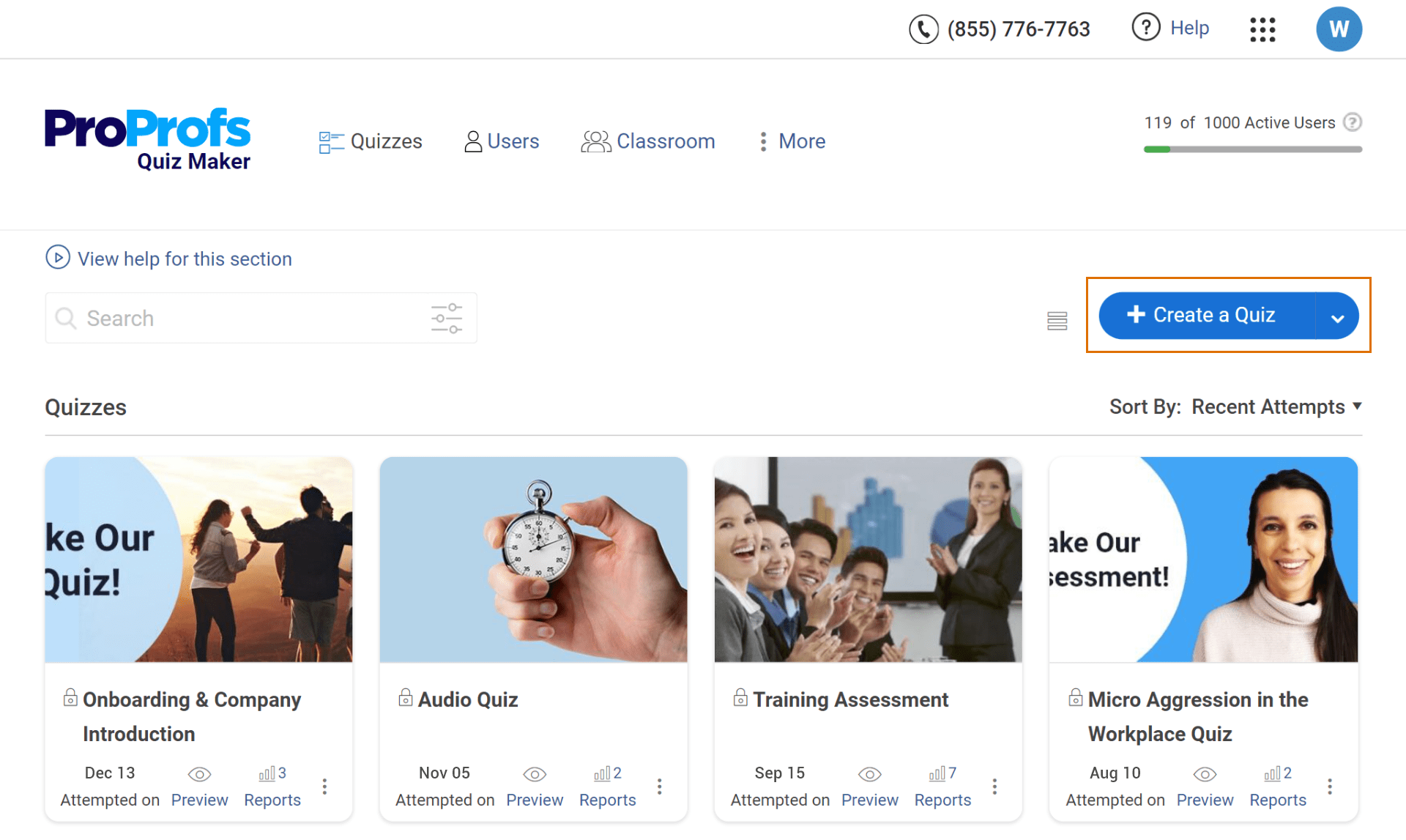
Step 2: Click the ‘Create Your Own’ button on the next screen. You’ll be taken to the quiz editor window, where you can start building your quiz.
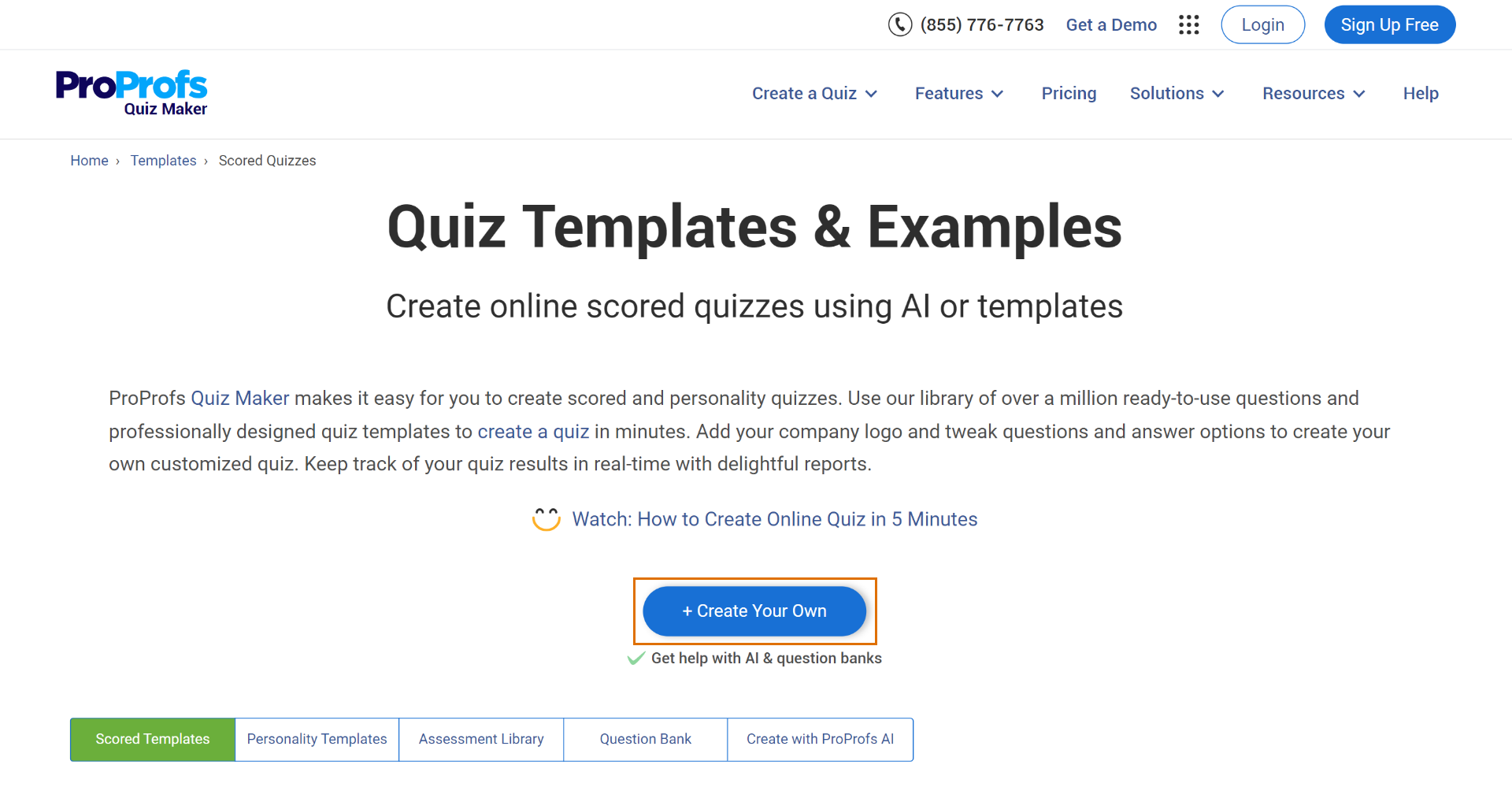
Step 3: Click “Edit Cover” to add the quiz title, description, and cover image.
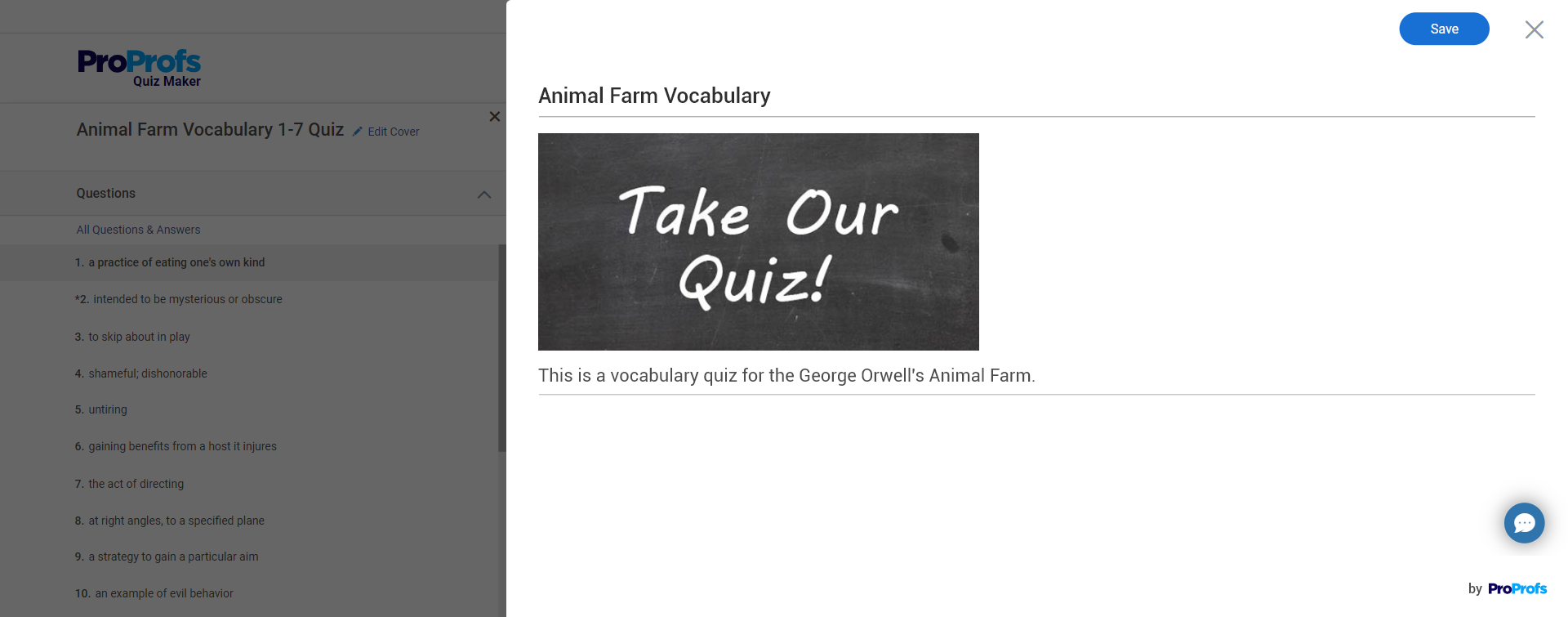
Step 4: Click “Add Question” on the panel on the right and choose a question format.
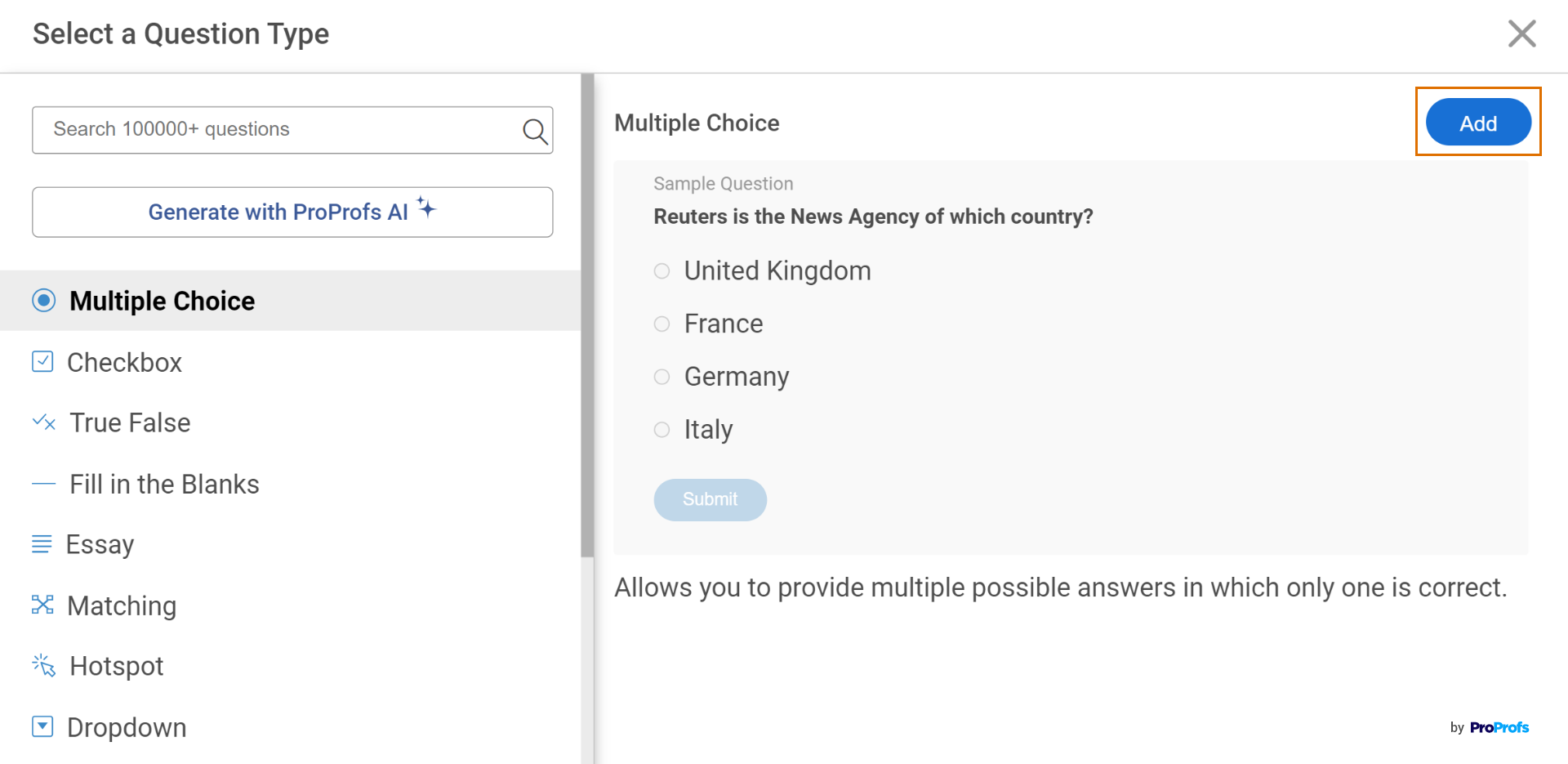
You can choose from 15+ question types, as shown in the video below.
Watch: 15+ Question Types for Online Learning & Assessment
Repeat this step till you’ve created all the questions. You can create your quiz with a single question type, such as MCQ, or have a mix of question types to make your quiz more interesting and fun.
Step 5: Add Instant Feedback
Not all self-assessment test creators offer this feature, but if you’re using a tool like the ProProfs Quiz Maker, you can display instant feedback when a question is answered. Doing so helps your learners identify knowledge gaps and improve their learning.

Read More: How to Add Feedback to Answers
After adding your questions and feedback, follow the same steps as in the “Creating a Quiz Using AI” method to configure grading and settings and customize how your quiz looks. Once you’ve done that, your quiz is ready to be shared.
Sharing the Assessment Quiz
Once you’re ready with the assessments, you can distribute them using different methods:
- Share a link through email or any other platform
- Embed the assessment on your website or blog
- Print the quiz
- Share the QR code for the quiz
Watch this quick video guide to learn about quiz sharing in ProProfs Quiz Maker.
Ready to Create a Self-Assessment for Students?
Self-assessments for students provide many benefits, such as increased self-awareness, goal setting, motivation, critical thinking, independence, effective decision-making, increased self-confidence, and accountability. They empower students to take ownership of their learning, develop essential skills, and achieve academic and personal growth.
To create the most effective student self-assessments, you can use an online quiz tool, such as ProProfs Quiz Maker, which offers a variety of ways to create professional and educational assessments in just a few seconds.

 We'd love your feedback!
We'd love your feedback! Thanks for your feedback!
Thanks for your feedback!



